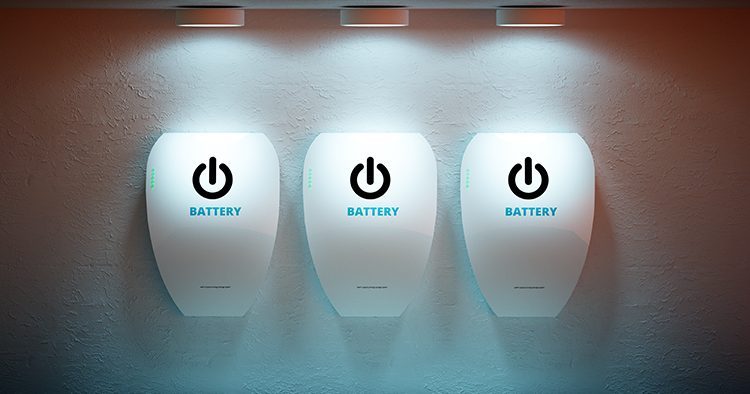Solar Panel Battery Storage – The Source For Energy In The Future?
Most people who install a solar system at their home are interested in storing the unused electricity that is produced by the panels. The stored electricity could be of use at nighttime or during days when the sun is barely out and the solar panels do not produce enough power. What storage systems are actually on the market and what is the best option? How is the development of the solar panel battery storage and is the investment in a storage system worth it?
The most important solar panel battery storage technologies
Typically batteries that are made for solar panel energy storage are made out of lead acid, lithium ion and saltwater.
Lead acid batteries
Lead acid batteries are one of the older technologies that have been used for decades. The technology of this battery type is highly developed and a lot of companies in solar industry produce lead acid batteries. On the solar market are two types of lead acid batteries available: flooded and sealed. Lead acid batteries are often the cheapest option when it comes to solar battery storage solution. But as a matter of fact, in comparison with other batteries that are based on different technologies, the lifespan of the lead acid batteries is definitely shorter and they have a slower charging cycle. A disadvantage is also that they are quite bulky and are highly sensitive to ambient temperatures, when they are too high. The wrong temperature can shorten the lifespan of lead acid batteries.
Lithium ion batteries
Nowadays, when a new home solar energy storage system is installed, lithium ion batteries are used. You actually do use lithium ion batteries in your everyday life, since they part of almost every laptop and smartphone. On the solar market there are several types of lithium ion batteries, most commonly are the lithium nickel-manganese-cobalt (NMC) as well as the lithium iron phosphate (LiFePO, or LFP). They are much more compact and lighter compared to lead acid batteries and are suitable for different ambient temperatures. Furthermore, they have a higher depth of discharge, a higher efficiency and a longer lifespan that lead acid batteries. These advantages do come with a price tag. Buyers have to consider that the price of lithium ion batteries is definitely more expensive than they have to pay for their lead acid counterparts. Another problem is the recycling process of lithium ion batteries which is quite complicated, but improves in the future.
Saltwater batteries
Saltwater batteries are a quite new option on the solar market. The innovative technology of the batteries relies on saltwater electrolytes rather than on heavy metals. A good argument for saltwater batteries is that they can be recycled and they are therefore much friendlier to the environment than lithium ion batteries or lead acid batteries. Furthermore, they have the advantage that they can be discharged to 100% of their capacity and that they do not lose capacity over time. But since the technology is still in its early stages, there are no real statistics or reliable datasets that can give a clear answer on how long they work and other important issues. At the moment their price is even higher than the one of lithium ion batteries, which might change, when more companies enter the market with solar panel battery storage options that are based on saltwater electrolytes.
How have the prices for storage systems developed?
The cost and the overall benefits do determine if an investment in a solar panel battery storage system is worth it. While the economics are quite easy, when it comes to a standard solar energy system, adding a solar panel battery storage system makes the calculation a great deal more complex. If you have a high electricity bill, solar panels are a good option to cut down the cost of power and the investment pays off most of the times in just a few years. Since the solar panel battery storages are a costly investment and do currently not work forever but rather have to be replaced after a certain time, you should think thoroughly about the investment. Additionally, you do not only have to calculate the cost of the battery storage system but furthermore the price you have to pay for the installment of the solar panel battery storage system. But as it was with the prices for solar panels, the cost of solar energy battery storage system did sink since their introduction on the solar energy market.
Insights to the solar panel battery storage market
Overall, energy storage systems are an efficient technology for an ideal usage of renewable energy. With the digitization of our everyday life as well as our business life, the amount of energy that we use is steadily growing across the globe.
On the other hand, we are currently reconsidering the way we produce electricity and what ways are more convenient than the nowadays conventional ones (nuclear and coal power). Renewable energies like solar are an alternative and do have the benefit of being able to be used everywhere on earth.
Another big plus is the possibility that every house owner could become his or her own energy producer by placing solar panels on their roof and therefore becoming independent of the production of energy by companies. With this in mind, a lot of companies as well as governments have supported the innovation process in solar technology with high investments.
Europe and North America have the leading nations on the solar marked and have contributed to the growth of the solar energy market by investing large sums. In 2018 the European Union and Bill Gates for example announced to set up a 100 million Euro Fund with the aim to push low-cost solar and to develop new technologies in the field of solar panel battery storage. Additionally to large investments in the solar energy market, more and more governments are promoting the change to solar power by putting in place regulations, subsidies and innovative vendors.
Further developments
All major economy analytic firms like McKinsey do predict a significant market growth and that the prices for storage systems will decrease as more and more products will enter the market and the technology behind the storage systems will further develop. On the residential segment in particular, they predict an increase in the market growth and usage of solar panel energy and battery storage systems. With sinking storage costs, solar power will be a future energy source that will be widely used, and in the long-term a cheaper way to produce power than the current ways of producing energy.
But as promising as this development and the predictions for the future sound, there are some obstacles the solar panel battery storage market faces. Solar power and the storage of solar energy depend highly on the solar intensity. In some areas with lesser sunny days, the investment in solar storage pays off way later than in sunny areas of the world. There is also the hurdle of efficiency.
Today better efficiency of solar panels also means a higher production price and therefore a higher market price. And there is also the question of the environmental effects. Keep in mind that most storage solution have to be recycled in a very complicated way or cannot be recycled at all. As the solar technology market and the product improve, this might be another situation in the future – at least that’s the hope for the future.





